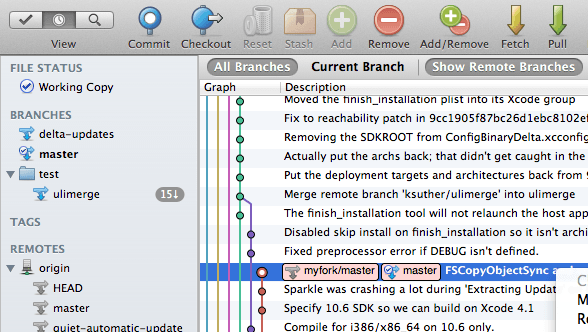Also available for Mac OS X A free Git client for Windows and Mac Sourcetree simplifies how you interact with your Git repositories so you can focus on coding. Visualize and manage your repositories through Sourcetree's simple Git GUI. Git comes with built-in GUI tools for committing and browsing, but there are several third-party tools for users looking for platform-specific experience. If you want to add another GUI tool to this list, just follow the instructions.
Git for Mac OS X
Note: We recommend downloading the latest Git release available. Git version 1.6.6 or newer is required for optimal network performance.
Mac command line Git clients
Official Git Client
The official Git SCM project provides official builds of the Mac OS X command-line Git client as a free download. If you are using Mac OS X then this is the recommended download for all Git users.
Graphical Git Installer
The git-osx-installer packages provides an easy-to-use graphical installer to install the latest version of Git command line tools for Mac OS X.
MacPorts
A recent version of the Git command-line client is available from the MacPorts community-supported collection of open-source software.
Mac GUI Git clients
GitX-dev
GitX-dev is a fork of the original GitX GUI for Mac OS X (the original is no longer maintained). It provides the ability to browse your repository revision history, diff changes, and supports most of the regular Git operations. This GUI client is available free of charge.
SmartGit
SmartGit/Hg is a commercial GUI Git/Mercurial client for Mac OS X. This is a cross-platform license, so the one licence can be used on all supported platforms: Mac, Windows and Linux.
Mac IDE Git clients
Xcode
Git support is included in Apple's powerful Xcode Integrated Development Environment. Installing Xcode also includes a version of the Mac OS X command-line Git tools.
Git Diff Tools For Mac
Eclipse IDE
Eclipse is a cross-platform IDE that also supports Mac OS X. The EGit plug-in provides seamless Git integration. EGit is implemented on top of JGit, the Java implementation of Git, and contains most of the functionality required to work with any Git repository.
You can't use Git until you make it available on your computer. There are a couple different ways you can install Git and make it available for use. The option you choose will depend on the system you are running.
Git Client For Mac
In this article, I will show you how to install Git on a MAC OS, as well as how to install Git on LINUX.
A couple of things you will want to make note of while interacting with Git.
- Even if you already have Git installed it is a good idea to update to the latest version.
- All of the commands below should work, even on the older versions of Git. They may act a little differently but should work. Git is very good at preserving backward compatibility. Any version after 2.0 should work just fine.
How To Install Git on MAC OS

There are a couple of ways to install Git on MAC OS. The easiest way to do it would probably be to install the Xcode Command Line Tools. This will work on Mavericks (10.9) or above, so it should cover you. If you are running on OS older than that I would recommend you look into upgrading that first.
If your MAC OS is good to go simply run git from the Terminal the very first time. Here is what that would look like:
If it isn't installed you will be prompted to install. If it is installed, then the above command should output the current version installed.
If you need or want a more up-to-date version, then you can install Git on MAC OS via a binary installer. There is a MAC OS Git installer that is maintained and made available for download on the Git website, at https://git-scm.com/download/mac.
Finally, a third option of installing Git on MAC OS is to install it as part of the GitHub for MAC install.
They have a GUI Git tool that has an option to install command line tools as well. You can download this tool from the GitHub for MAC website, at https://mac.github.com.
How To Install Git on Linux
More often than not you can install Git on Linux via a binary installer through the package management tool that comes with your distribution.
If you're on Fedora or other closely related RPM-based distribution, like RHEL or CentOS, you can use dnf:
$ sudo dnf install git-all
If you happen to be on a Debian-based distribution, like Ubuntu, try using apt:
Installation For Other Unix Distributions
Gentoo
# emerge –ask –verbose dev-vcs/git
Arch Linux
openSUSE
# zypper install git
Mageia
Nix/NixOS
# nix-env -i git
FreeBSD Nokia pc suite windows 7.
Solaris 9/10/11 (OpenCSW)
# pkgutil -i git Virtualization for mac os.
Solaris 11 Express
Download Git On Mac
OpenBSD
# pkg_add git
Alpine Convert wav to flac mac.
Git Tools For Mac
Slitaz
$ tazpkg get-install git
Author: Jeremy Holcombe
Growing up in Hawaii, Jeremy started his freelance writing career doing resumes, business plans, article writing, and everything in between. He now specializes in online marketing and content writing and is part of the Content Marketing Team at GreenGeeks.

